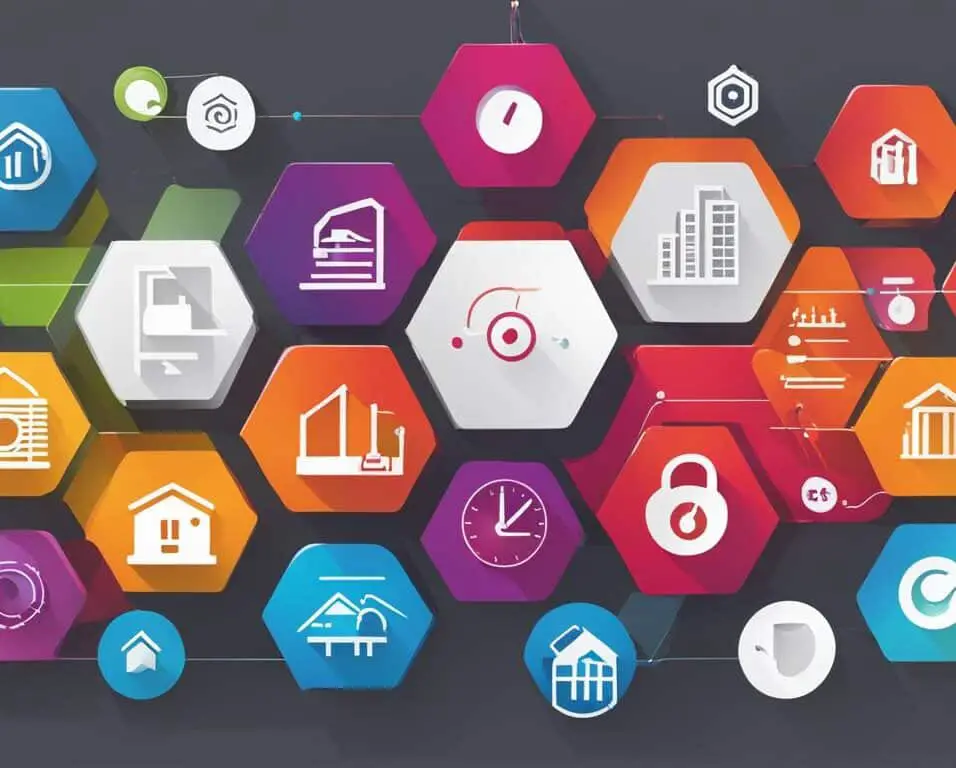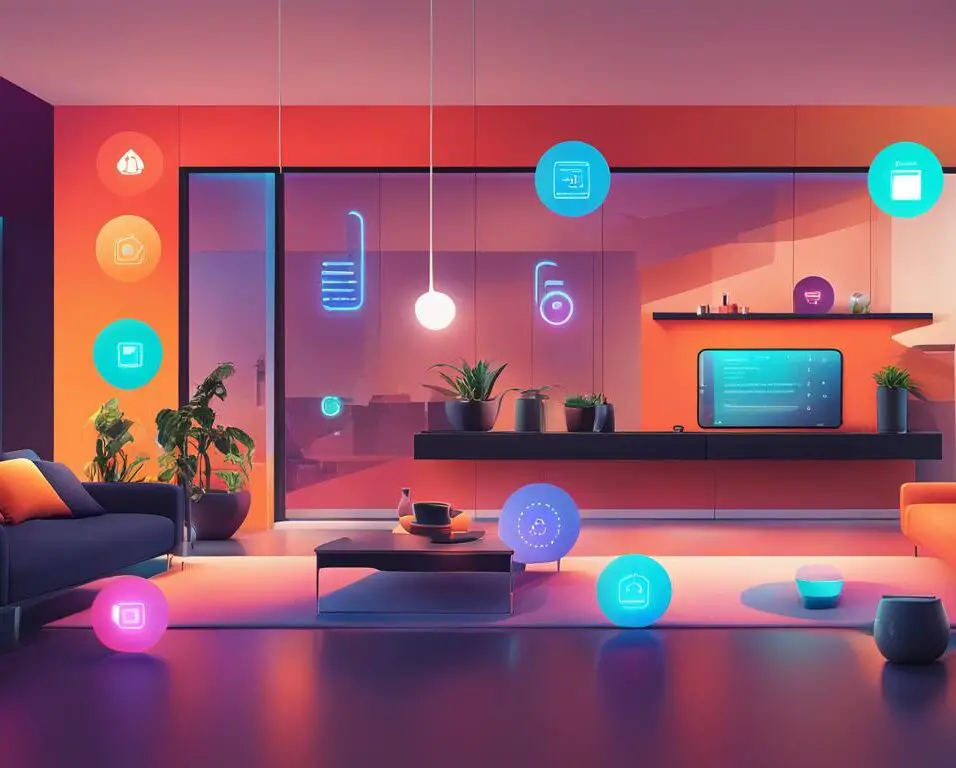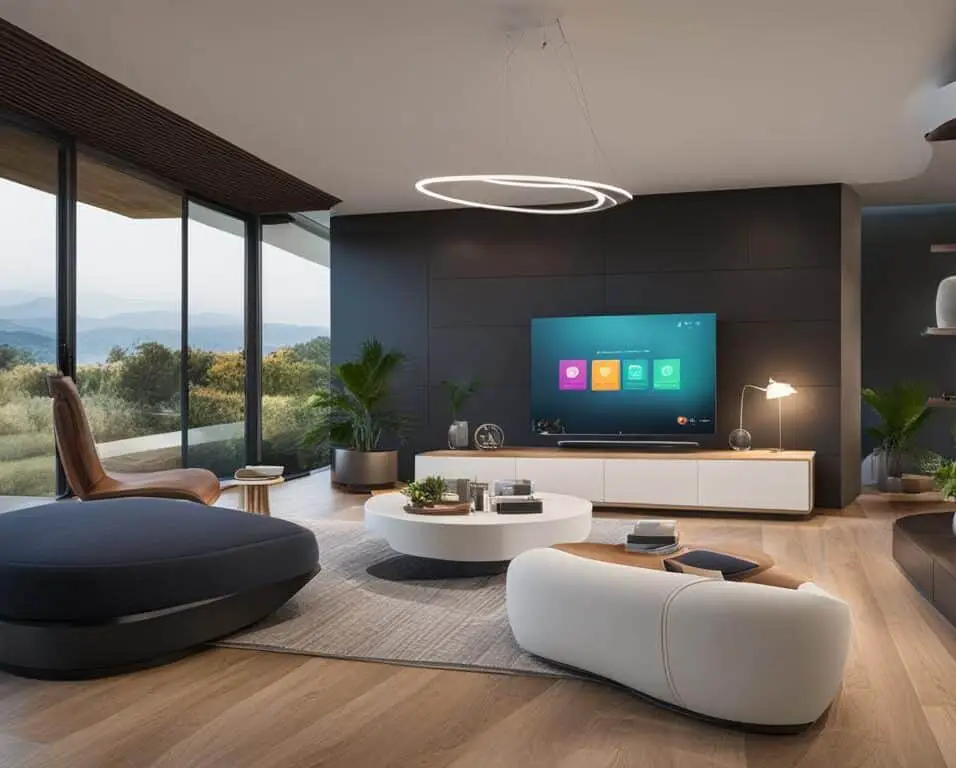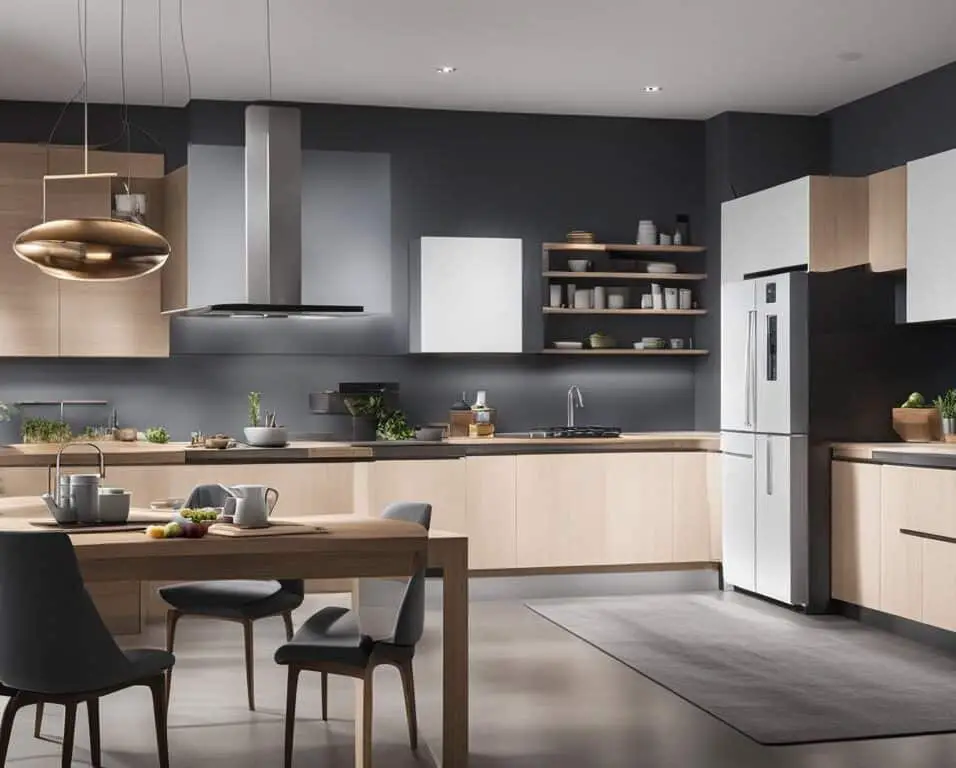Smart Homes: The IoT Revolution
Welcome to the world of smart homes, where technology is transforming the way we live. With the integration of Internet of Things (IoT) devices, our homes are becoming more efficient, convenient, and secure than ever before. From controlling our appliances remotely to enhancing our safety, IoT in smart homes is redefining modern living.
The IoT revolution in smart homes is all about connecting our devices and systems to create a seamless and intelligent living environment. By integrating IoT devices, we can automate tasks, monitor our homes remotely, and enjoy personalized experiences. Imagine being able to adjust the temperature, turn on the lights, or even receive alerts about a potential security breach, all through a simple app on your smartphone.
When it comes to integrating IoT devices, the possibilities are endless. From home automation and security to energy efficiency and entertainment, there are countless applications that make our lives easier and more enjoyable. It’s time to explore the exciting world of IoT in smart homes and discover the benefits, challenges, and future trends it brings.
Key Takeaways:
- Smart homes, equipped with IoT devices, are revolutionizing modern living.
- IoT technology enables automation, remote monitoring, and personalized experiences in smart homes.
- Key applications of IoT in smart homes include home automation, security and surveillance, energy efficiency, entertainment, health and well-being, home maintenance, home appliances, and voice assistants.
- The benefits of IoT in smart homes range from convenience and enhanced security to energy efficiency and customized experiences.
- Challenges to consider include data security and privacy, interoperability, reliability, cost of implementation, and workforce training.
Key Applications of IoT in Smart Homes
IoT technology plays a pivotal role in transforming ordinary homes into smart homes with a range of innovative applications. These applications bring convenience, security, energy efficiency, entertainment, health and well-being, home maintenance, home appliances, and voice assistants right to your fingertips.
Home Automation
At the heart of the smart home revolution lies home automation. IoT enables seamless control and automation of various tasks, such as controlling lights, thermostats, and appliances remotely or on a schedule. Imagine walking into a well-lit, perfectly cooled home without lifting a finger or remotely turning off appliances left running. With IoT-powered home automation, everything becomes effortless.
Security and Surveillance
Smart home security systems have become increasingly sophisticated, integrating IoT devices like smart doorbells and cameras to provide real-time monitoring and alerts. Whether you’re at work or on vacation, you can have peace of mind knowing that you can keep an eye on your property and receive instant notifications in case of any security breaches.
Energy Efficiency
The IoT revolution has also extended to energy management in smart homes. With smart thermostats, lighting systems, and appliances, homeowners can optimize their energy consumption, reducing costs and minimizing their environmental impact. Imagine a home that adjusts its temperature, lighting, and energy usage based on your preferences and habits to maximize efficiency.
Entertainment
Smart homes offer a new level of entertainment integration. IoT allows for seamless integration of entertainment systems, enabling homeowners to control their audio, video, and streaming devices through voice commands or mobile apps. You can create the perfect ambiance for movie nights, parties, or simply a relaxing evening, all with the touch of a button or a voice command.
Health and Well-Being
The IoT revolution also extends to the healthcare domain in smart homes. IoT devices enable remote health monitoring, allowing healthcare providers to track patients’ vital signs and provide timely care. From wearable devices to smart home sensors, the IoT ensures that individuals can lead healthier lives by monitoring their health metrics and sharing real-time data with healthcare professionals.
Home Maintenance
IoT sensors play a crucial role in monitoring and maintaining the overall condition of a smart home. These sensors can detect potential issues, such as leaks, temperature fluctuations, and humidity levels, enabling homeowners to address maintenance needs promptly. By having this data at their fingertips, homeowners can prevent costly repairs and ensure their homes remain in pristine condition.
Home Appliances
IoT technology has transformed standard home appliances into smart devices that communicate with homeowners. From refrigerators that notify you when you’re running low on groceries to washing machines that can be controlled remotely, these appliances bring convenience and efficiency to everyday tasks, making life easier and more enjoyable.
Voice Assistants
Voice assistants have become an integral part of smart homes. IoT technology enables voice control of various devices and systems throughout the house. With a simple voice command, you can adjust the thermostat, turn on/off lights, play music, and even order groceries. Voice assistants like Amazon’s Alexa and Google Assistant have revolutionized how we interact with our smart homes.
| Key Applications of IoT in Smart Homes | Description |
|---|---|
| Home Automation | Enables control and automation of various tasks in smart homes. |
| Security and Surveillance | Real-time monitoring and alert systems for enhanced home security. |
| Energy Efficiency | Optimizes energy consumption and reduces costs through smart devices. |
| Entertainment | Seamless integration of audio, video, and streaming devices for enhanced entertainment experiences. |
| Health and Well-Being | Remote health monitoring and tracking of vital signs for improved well-being. |
| Home Maintenance | Monitors home conditions and detects potential maintenance needs. |
| Home Appliances | Transforms standard appliances into smart devices that offer convenience and efficiency. |
| Voice Assistants | Enables voice control of various smart home devices. |
Benefits of IoT in Smart Homes
The integration of IoT in smart homes offers numerous advantages. Let’s explore some of the key benefits:
1. Convenience
Controlling devices remotely allows for greater convenience in managing your home. Whether it’s adjusting the thermostat or turning off lights, you can do it all with just a few taps on your smartphone or through voice commands.
2. Enhanced Security
IoT-enabled smart home security systems provide enhanced security through real-time monitoring and instant alerts. With features like smart locks, security cameras, and motion sensors, you can keep your home safe and enjoy peace of mind even when you’re away.
3. Energy Efficiency
IoT devices help promote energy efficiency by optimizing energy consumption. Smart thermostats, intelligent lighting systems, and energy-efficient appliances can automatically adjust settings based on occupancy, time of day, or overall energy usage, helping you reduce energy waste and lower utility costs.
4. Personalization
With IoT, you can personalize your living environment according to your preferences. Smart home automation systems allow you to create customized settings for different scenarios. For example, you can create a “movie night” scene that dims the lights, adjusts the temperature, and starts your favorite movie at the touch of a button.
5. Safety
Smart homes offer advanced safety features. Smart locks eliminate the need for traditional keys and provide remote access control. Security cameras and doorbell cameras allow you to monitor your home in real-time. Smoke detectors and leak sensors can send alerts to your phone, ensuring timely action in case of emergencies.
6. Accessibility
IoT technology makes homes more accessible for individuals with disabilities. Voice-activated devices and smart home assistants enable hands-free control of various functions, making it easier for people with mobility challenges to navigate their living spaces. The automation of routine tasks also reduces the physical effort required.
Overall, integrating IoT in smart homes brings convenience, enhanced security, energy efficiency, personalization, safety, and accessibility to the forefront, enhancing our daily lives and transforming the way we experience our homes.

Challenges and Considerations
While IoT in smart homes offers numerous benefits, it also presents several challenges that need to be addressed. These include:
Data Security and Privacy
Ensuring data security and privacy is crucial to protect personal information from unauthorized access or breaches. Robust security measures must be implemented to safeguard sensitive data.
Interoperability
Interoperability between different devices and systems is essential for seamless data exchange and efficient communication. Compatibility issues can hinder the integration of IoT devices, requiring standardization and compatibility protocols.
Reliability
The performance and reliability of IoT devices must be consistent to build trust among homeowners. Unreliable devices can lead to disruptions in daily routines and undermine the overall convenience of smart homes.
Cost of Implementation
The initial cost of implementing IoT in smart homes can be a barrier for many homeowners. The investment required for purchasing and installing IoT devices and systems needs to be carefully evaluated, considering the return on investment (ROI) and long-term benefits.
Workforce Training
Successful adoption of IoT in smart homes requires adequate workforce training. Professionals need to develop the necessary skills to install, configure, and maintain IoT devices and systems. Additionally, cultural shifts may be necessary to embrace and utilize the potential of IoT technology effectively.
“The implementation of IoT in smart homes brings numerous benefits, but it is important to address challenges such as data security and privacy, interoperability, reliability, cost, and workforce training.”
To summarize, while IoT in smart homes offers exciting possibilities, it is essential to overcome challenges related to data security and privacy, interoperability, reliability, cost, and workforce training. By addressing these considerations, homeowners can fully harness the potential of IoT technology in creating efficient and personalized smart homes.
The Future of IoT in Smart Homes
As technology continues to advance, the future of IoT in smart homes looks incredibly promising. The combination of artificial intelligence (AI) with IoT will revolutionize automation and security systems, making them more intelligent and efficient. With interconnectivity at the forefront, smart homes will provide a seamless and unified experience for homeowners. Sustainability will also play a vital role, as IoT devices will be designed to minimize resource consumption and promote environmental responsibility.

One of the most exciting prospects for the future of IoT in smart homes is the integration of these intelligent homes with smart cities. As urban areas embrace smart technology, smart homes will become an integral part of the ecosystem. The interconnectivity between smart homes and smart cities will create a sustainable urban living experience by optimizing resource allocation, reducing traffic congestion, and improving overall quality of life.
Artificial intelligence will further enhance the capabilities of IoT in smart homes, enabling devices to learn and adapt to homeowners’ preferences. Machine learning algorithms will analyze data from various devices and sensors, enabling personalized and intuitive automation. Voice assistants will become even smarter, understanding natural language commands and performing complex tasks with ease.
“The integration of AI and IoT in smart homes will bring us closer to achieving truly intelligent and autonomous living environments.”
Safety and security will also be significantly enhanced, with advanced AI algorithms continuously monitoring and analyzing data to detect potential threats or anomalies. From facial recognition technology to proactive detection of unusual activities, AI-powered security systems will provide enhanced protection for homeowners.
As the future unfolds, sustainability and energy efficiency will be key drivers in the design and development of IoT devices for smart homes. These devices will leverage AI algorithms to monitor and optimize energy consumption, ultimately reducing the ecological footprint and contributing to a more sustainable future.
Key Takeaways
- The future of IoT in smart homes relies on the integration of AI, enhancing automation and security systems.
- Interconnectivity between devices will create a seamless and unified experience for homeowners.
- IoT devices will be designed to minimize resource consumption and promote sustainability.
- Integration with smart cities will optimize resource allocation and improve urban living.
- Artificial intelligence will enable personalized automation and intuitive control of smart homes.
- Advanced AI algorithms will provide enhanced safety and security features.
- Sustainability and energy efficiency will be prioritized in the design of IoT devices for smart homes.
Conclusion
Integrating IoT devices in smart homes is revolutionizing the way we live, providing efficient solutions for seamless control and enhanced living. The future of IoT in smart homes holds exciting possibilities, with advancements in AI, enhanced security, and increased connectivity. As technology continues to evolve, the potential of IoT implementation and smart devices to improve our lives is vast.
While challenges such as data security and compatibility exist, the industry is actively developing solutions to overcome these obstacles. The integration of IoT in smart homes offers numerous benefits, including convenience, enhanced security, energy efficiency, personalization, safety, and accessibility.
“Integrating IoT devices in smart homes is revolutionizing the way we live, providing efficient solutions for seamless control and enhanced living.”
The advancement of AI technology will further enhance automation and security systems in smart homes. Interconnectivity between devices will become more seamless, creating a unified experience for homeowners. Sustainability will also be prioritized, with IoT devices designed to minimize resource consumption, contributing to a greener future.
As we look towards the future, the possibilities for IoT implementation and smart devices are limitless. The continuous evolution of technology will bring forth new trends and innovations, further enhancing the capabilities of smart homes.
Appendix
ByteCipher Pvt Ltd, a pioneer in IoT implementation, specializes in providing solutions for integrating IoT into smart devices. Our team of experts is dedicated to helping clients create innovative solutions that harness the power of IoT technology.
With our expertise in mobile apps, smart homes, and smart health, we offer comprehensive services that cater to diverse needs. Whether you are looking to develop a mobile app that integrates seamlessly with IoT devices or implement IoT solutions for smart homes and healthcare, ByteCipher has the knowledge and experience to make your vision a reality.
At ByteCipher, we are committed to building long-term partnerships with our clients. We work closely with you to understand your requirements and develop tailored solutions that meet your unique needs and preferences. Our goal is to deliver high-quality, reliable, and user-friendly IoT implementations that enhance efficiency, convenience, and security in your smart devices, mobile apps, smart homes, and smart health initiatives.
Contact us at [email protected] to discuss how ByteCipher can help you leverage the power of IoT in your projects. Let us take your smart devices, mobile apps, smart homes, and smart health solutions to the next level.
FAQ
What is a smart home?
A smart home is a residential space equipped with Internet of Things (IoT) devices and systems that allow for automation and control of various tasks, such as lighting, thermostats, and appliances.
What are the key applications of IoT in smart homes?
The key applications of IoT in smart homes include home automation, security and surveillance, energy efficiency, entertainment, health and well-being, home maintenance, home appliances, and voice assistants.
What are the benefits of IoT in smart homes?
The benefits of IoT in smart homes include convenience, enhanced security, energy efficiency, personalization, safety, and accessibility.
What are the challenges and considerations of implementing IoT in smart homes?
The challenges and considerations of implementing IoT in smart homes include data security and privacy, interoperability between devices and systems, reliability of IoT devices, cost of implementation, and workforce training.
What does the future hold for IoT in smart homes?
The future of IoT in smart homes looks promising, with advancements in artificial intelligence, enhanced security, interconnectivity, sustainability, and integration with smart cities.
Who can help with integrating IoT into smart devices?
ByteCipher Pvt Ltd, a pioneer in IoT implementation, offers solutions for integrating IoT into smart devices. They specialize in mobile apps, smart homes, and smart health, and are committed to partnering with their clients to build innovative solutions.
Source Links
- https://iotbusinessnews.com/2023/11/10/89810-the-smart-home-revolution-how-iot-is-transforming-modern-living/
- https://medium.com/illumination/the-impact-of-iot-on-smart-homes-pioneering-a-seamless-technological-lifestyle-d20916db020e
- https://www.linkedin.com/pulse/iot-revolution-implementing-smart-devices-connected








